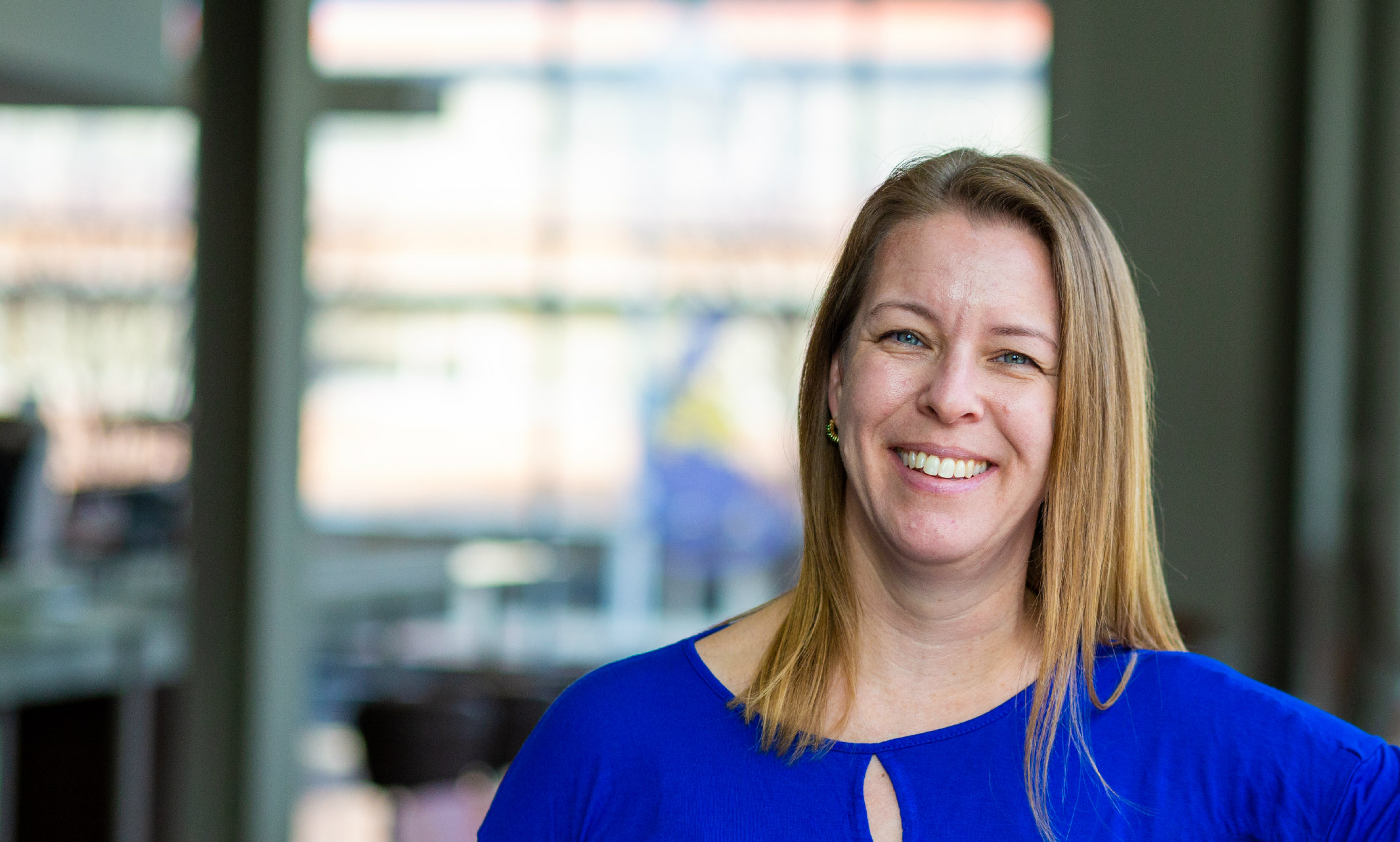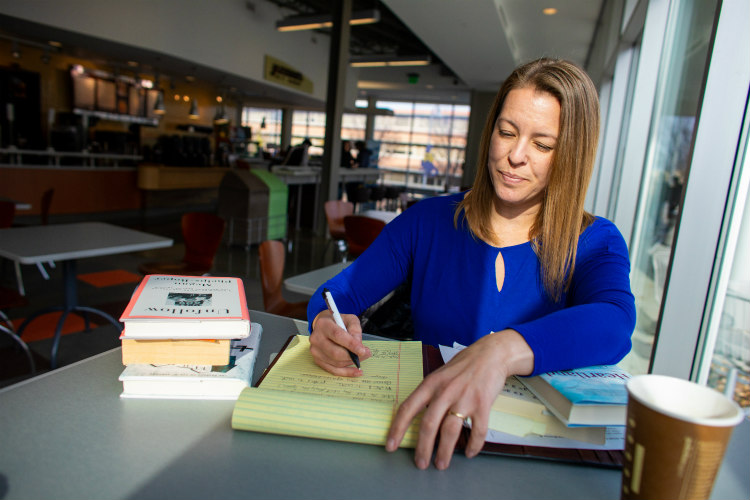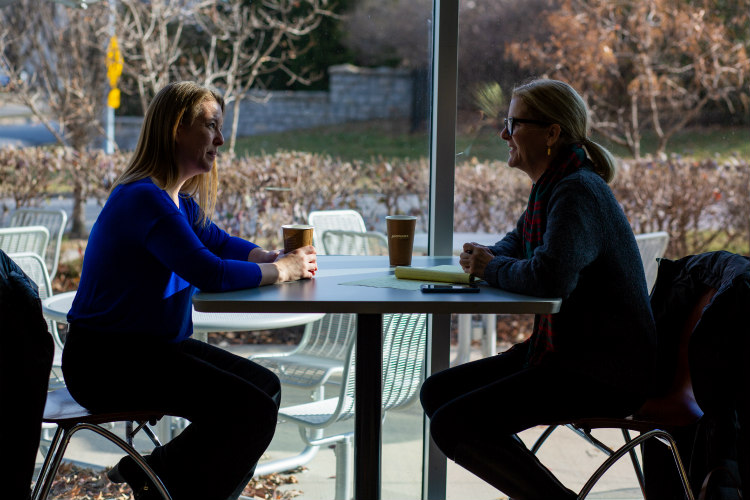Our ongoing story starts with people from around the world, converging here at UMKC. Get to know our people and you’ll know what UMKC is all about.
Name: Anne Kniggendorf '14
UMKC degree program: MFA in Creative Writing and Media Arts, College of Arts and Sciences
Alumna Anne Kniggendorf attended the MFA Creative Writing program on the G.I. Bill. While she always had a passion for writing, she did not see herself as a journalist. But her freelance career has been full of delightful surprises.
Tell us about your current position.
I’m a freelance writer in Kansas City. I started freelancing for the Kansas City Star in 2014 and I still write for them occasionally. I write for KCUR 89.3, the Kauffman Foundation, and have written for Flatland Magazine a few times. I’ve also written for national magazines and twice for international journals.
How did you choose your field of study?
Writing has been my favorite activity for as long as I can remember. I got to a point when I was in my mid-30s when I felt that I’d hit a wall. I needed more tools to write the way I wanted to be able to.
What brought you to UMKC?
I wanted a writing program near home and UMKC seemed perfect.
What was your favorite thing about UMKC?
I enjoyed all of my classes, professors and assignments. My favorite thing was the chance to reopen the part of my mind that had to work with whatever someone else assigned me--which is what I’ve been doing ever since.
What did you learn about yourself while you were here?
At UMKC, I learned that I was holding myself back from being a writer. I saw that Kansas City is home to a community of writers who are generally willing to help each other, and that all I needed to do was show up and work to be a part of it.
“At UMKC, I learned that I was holding myself back from being a writer.”

Who was the most influential faculty or staff member at UMKC?
As far as working hard and diligently, Whitney Terrell encouraged me more than anyone else. He was in charge of The Kansas City Star internship at the time, and he selected me for that program.
How did the internship affect how you viewed the field?
I don’t think I’d be doing what I’m doing now if I hadn’t had the opportunity at The Star. Learning how to work with an editor and write under a deadline was a lot different from writing for leisure. I hadn’t worked with deadlines since my early 20s, and I had to write a book review every week for an entire semester. At the same time I was learning how to work that hard at writing, I was writing my thesis and taking two or three other classes.
What are the challenges of your field?
I told myself until I was about 37 that writing isn’t a job. I think lots of people in the arts feel this way, because it’s culturally accepted that no one in the arts makes much money. The exceptions are so few. There’s no writer who expects to grow up to be the next Stephen King.
What are the benefits?
Every assignment I take is different from the last one, and I meet new people all the time who are really fascinating and eager to talk to me about what they love doing.

What has been one of your favorite freelance assignments?
I just did a story for KCUR with Megan Phelps-Roper (granddaughter of the late Fred Phelps of Westboro Baptist Church) about her new book “Unfollow.” Because I grew up in the area and heard about the Westboro members’ picketing, I was really interested in being able to sit with her ask about her experiences.
I had a great learning opportunity when I did a story about a buffalo ranch. Amy and Michael Billings are interested in conserving bison in an effort to preserve the ecosystem of their land. As it turned out, conservation and slaughter are compatible. If you want to save something, you need to eat it.
How did UMKC help you reach your current position?
In a very real way, the internship at The Star that I got while I was in the program put me on the path I’m on now, but beyond that, the feedback about my work from the professors and other students really highlighted my strengths and weaknesses in ways I hadn’t seen before.
What are your goals for the future?
I want to keep writing for media outlets and organizations. I’m also working on two books. “Secret Kansas City,” which is part of a series about weird, mysterious, unexpected or goofy stories about individual cities, will be published in fall 2020. The publisher found me and asked me to write it.
I’ve been working on my own book for six years. It’s about the relationship between military service and the liberal arts. I think’s there’s a connection, and I don’t think it’s smart to separate them. I have the whole narrative in place, but I just don’t think it’s as succinct as it needs to be.
Would you recommend the MFA program?
Yes, it strengthened my writing in a lot of ways. The process of giving and receiving feedback was helpful. But one of the things that was really significant was getting the opportunity to write across genres. It’s been super valuable and not every MFA program has that. While I wasn’t initially interested in poetry, I enjoyed those classes. And there’s a lot to be learned from poetry courses – like word economy – that have helped in journalism. Playwriting and learning about writing dialogue helped with choosing quotations to support the ideas in my articles. Every day when I’m writing I’m thinking what can I do to draw people into the story? What’s the point that will make someone care enough to keep reading?” Those are things I learned in the MFA program.
“Every day when I’m writing I’m thinking what can I do to draw people into the story? Those are things I learned in the MFA program.”

What is one word that best describes you?
Tenacious.
Do you have a motto you live by?
Don’t panic...
What is your advice for a student entering UMKC?
If you study what you really want to know about, whether that’s in a larger sense like your degree program, or on a smaller scale like topics you choose for papers, you’ll learn more and work harder than if you study something you imagine would be good to know, or that someone else wants you to learn about.

